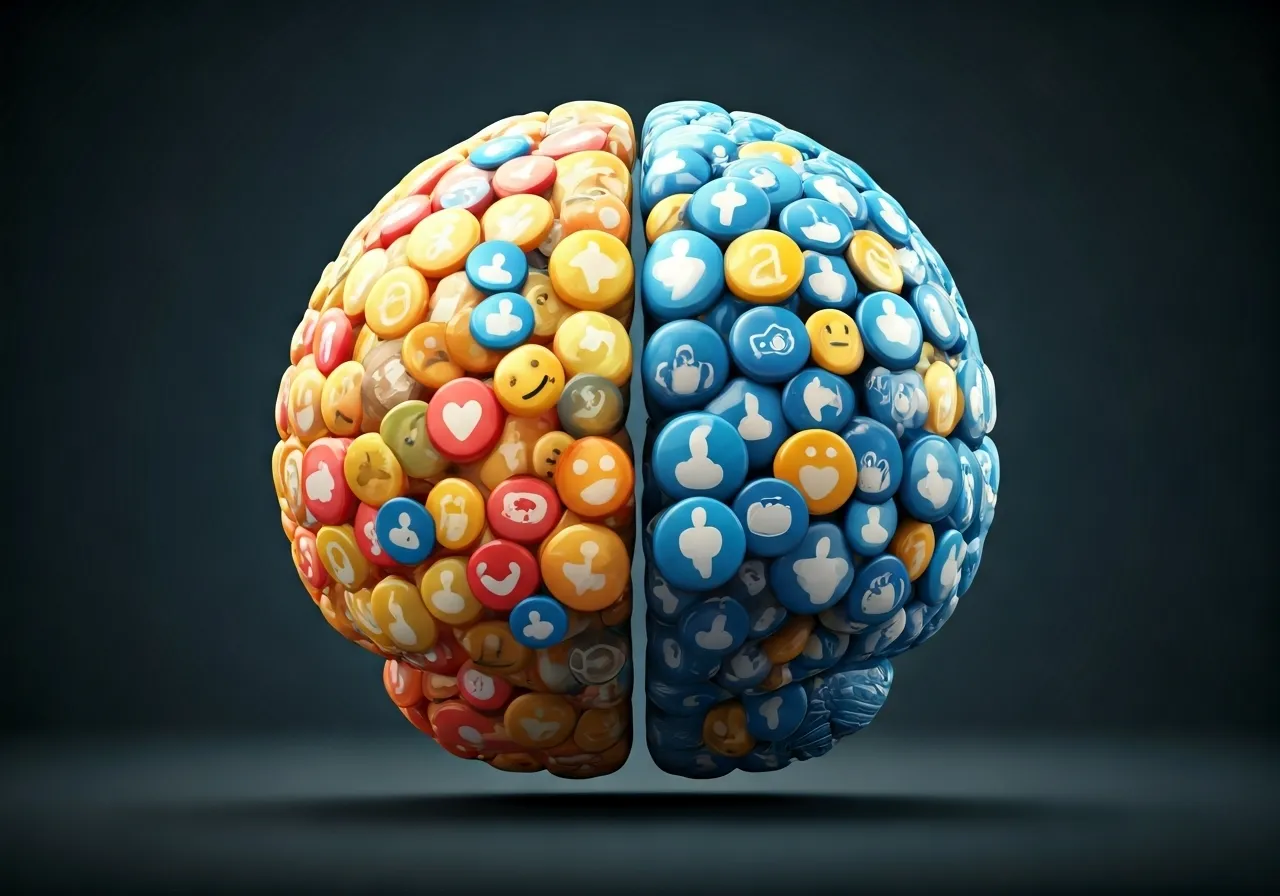
The relationship between mental health and social media is an increasingly prominent topic across the United States. As social media platforms continue to shape how people connect and communicate, rising concerns about the symptoms of anxiety disorders have come into focus. Regular exposure to social media can influence how you view yourself and others, creating new challenges for those already struggling with mental health issues. Understanding this dynamic is essential for identifying the signs of anxiety disorders and developing healthier patterns of social media use.
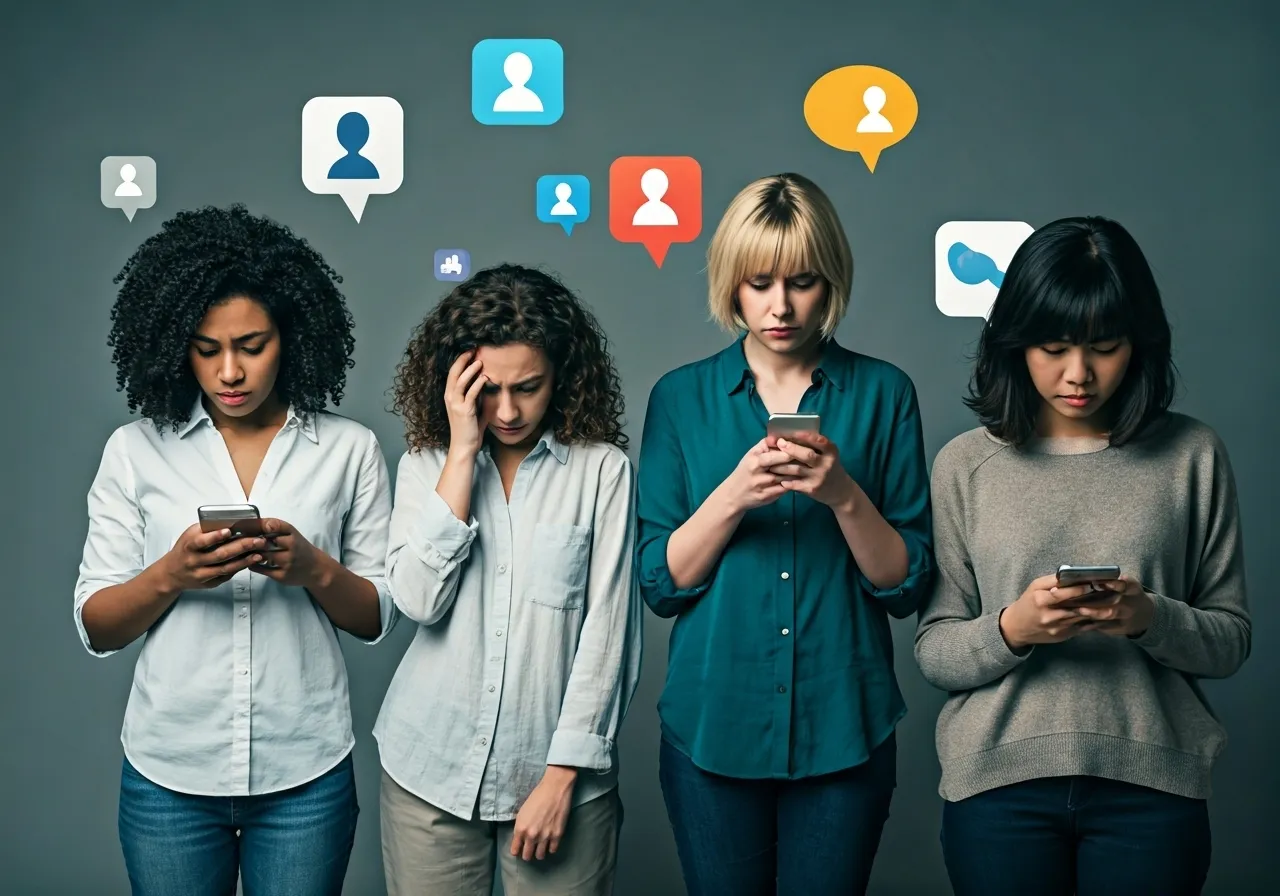
Social media use has grown rapidly, making it a significant factor in modern mental health. Studies show that frequent engagement with platforms can contribute to mental health issues, including anxiety and depression. The constant exposure to curated content, peer comparison, and online interactions often leads to negative effects, especially for individuals vulnerable to mental health concerns.
For many, regular use of social media intensifies feelings of inadequacy and worry. The tendency to compare oneself to idealized images or experiences can be damaging, increasing symptoms linked to levels of anxiety disorders and depressive symptoms. Recognizing these patterns is crucial for responding to the mental health challenges that stem from social media use.
In Houston, TX, social media usage mirrors national trends seen across the United States. Platforms such as Facebook, Instagram, Twitter, and TikTok are integrated into daily life, with residents using them for both social interaction and information. This widespread adoption has brought public health questions into sharper focus, especially as mental health concerns rise among local communities.
The impact of these platforms extends beyond communication, influencing behaviors and emotional health. Houston’s diverse population finds both connection and stress through social media, depending on usage patterns. For young adults and teenagers in the city, frequent engagement with digital content has become the norm, raising concerns about screen time and negative experiences.
Public health authorities in Houston recognize the role of social media in shaping mental health outcomes, aligning with the principles of human services. Initiatives are increasingly aimed at educating residents about healthy usage and the risks of excessive social media use. These efforts reflect a growing acknowledgment that social media platforms affect mental health at both individual and community levels.
With the rise of social media platforms, mental health concerns have become more pronounced, especially among vulnerable groups. A systematic review of research indicates that regular use can worsen mental health problems, such as increasing symptoms of anxiety and depressive symptoms. These effects are often linked to negative experiences and online interactions.
The balance between risks and benefits depends on how social media is used. While the risks are well-documented, especially for those prone to mental health disorders, there are also notable benefits when platforms are leveraged for connection and support.
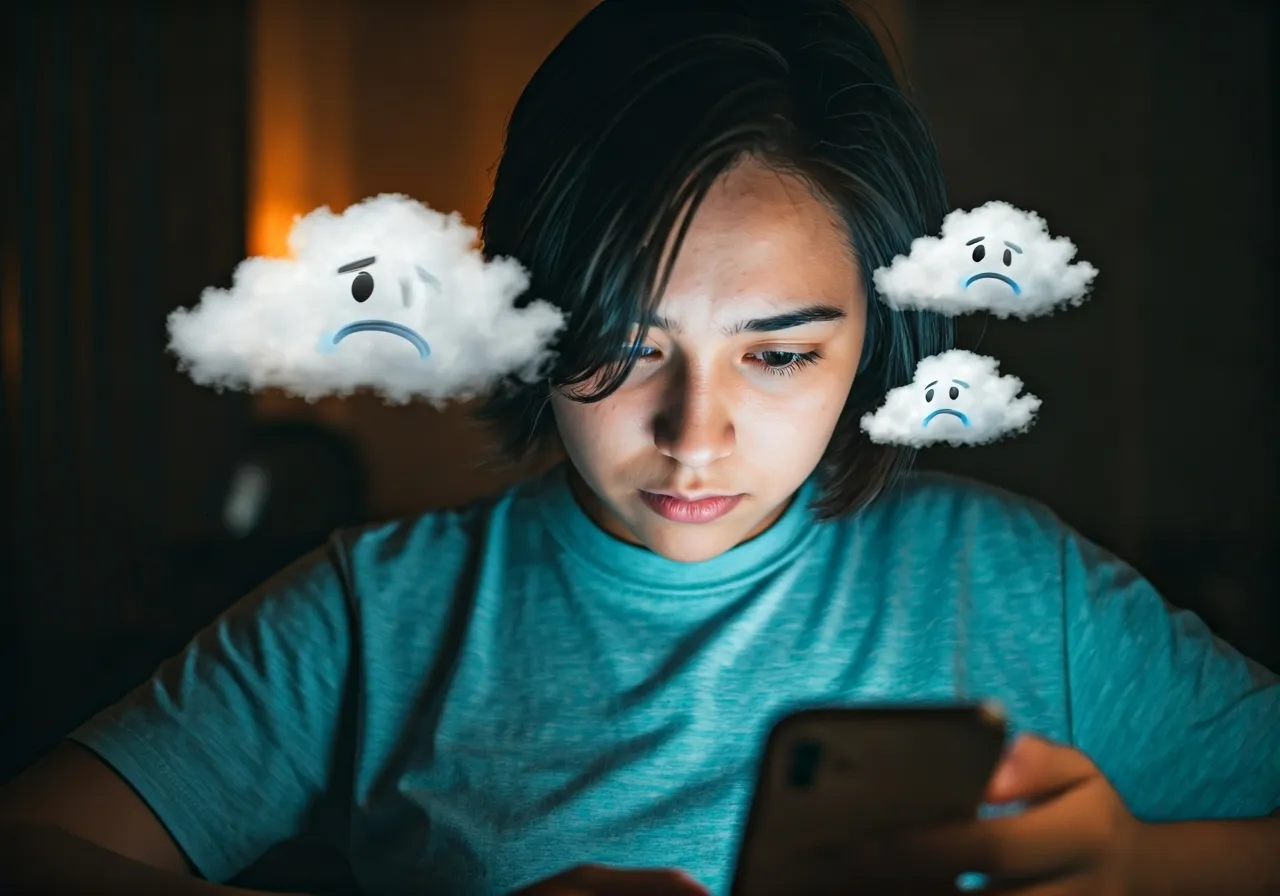
Social media’s psychological effects are evident in the growing rates of anxiety disorders and depressive symptoms among users, particularly teens and young adults. According to the Cleveland Clinic, constant connectivity and exposure to online feedback can cause persistent worry, self-doubt, and even panic attacks, impacting your overall quality of life.
For some individuals, high social media use may contribute directly to the development of anxiety disorders. If you’re frequently feeling nervous, restless, or unable to control your worry after engaging online, it may signal a need to reassess your habits and seek professional support.
Interacting on social media platforms can initiate or worsen anxiety symptoms, particularly for those already at risk for social anxiety disorder. The pressure to present a perfect image or keep up with online trends leads to heightened self-consciousness and fear of negative evaluation.
If you experience restlessness, persistent worry about online interactions, or feel a sense of impending danger, these could be signs of anxiety disorder symptoms, including physical symptoms triggered by social media. Some people avoid real-life events to escape the discomfort brought on by digital comparisons and criticism, further isolating themselves.
Warning signs of social media addiction affecting mental health include:
Recognizing these patterns early allows for intervention before anxiety symptoms escalate into more severe mental health disorders.
There is a clear association between depression and frequent social media use, particularly among young adults. The constant stream of content can make users feel left out, inadequate, or unworthy, fueling symptoms of depression and, in some cases, major depressive disorder.
Symptoms of depression linked to social media include persistent sadness, loss of interest in activities, and trouble sleeping. These feelings can be intensified by exposure to cyberbullying, negative comments, or seeing others’ seemingly perfect lives. According to a nationally representative study, participants in the highest quartile of social media use had significantly higher odds of depression compared to those using it less.
Monitoring your moods after using social media and reflecting on any negative changes is crucial. If depressive symptoms persist, it’s important to reach out to a mental health provider for assessment and support.
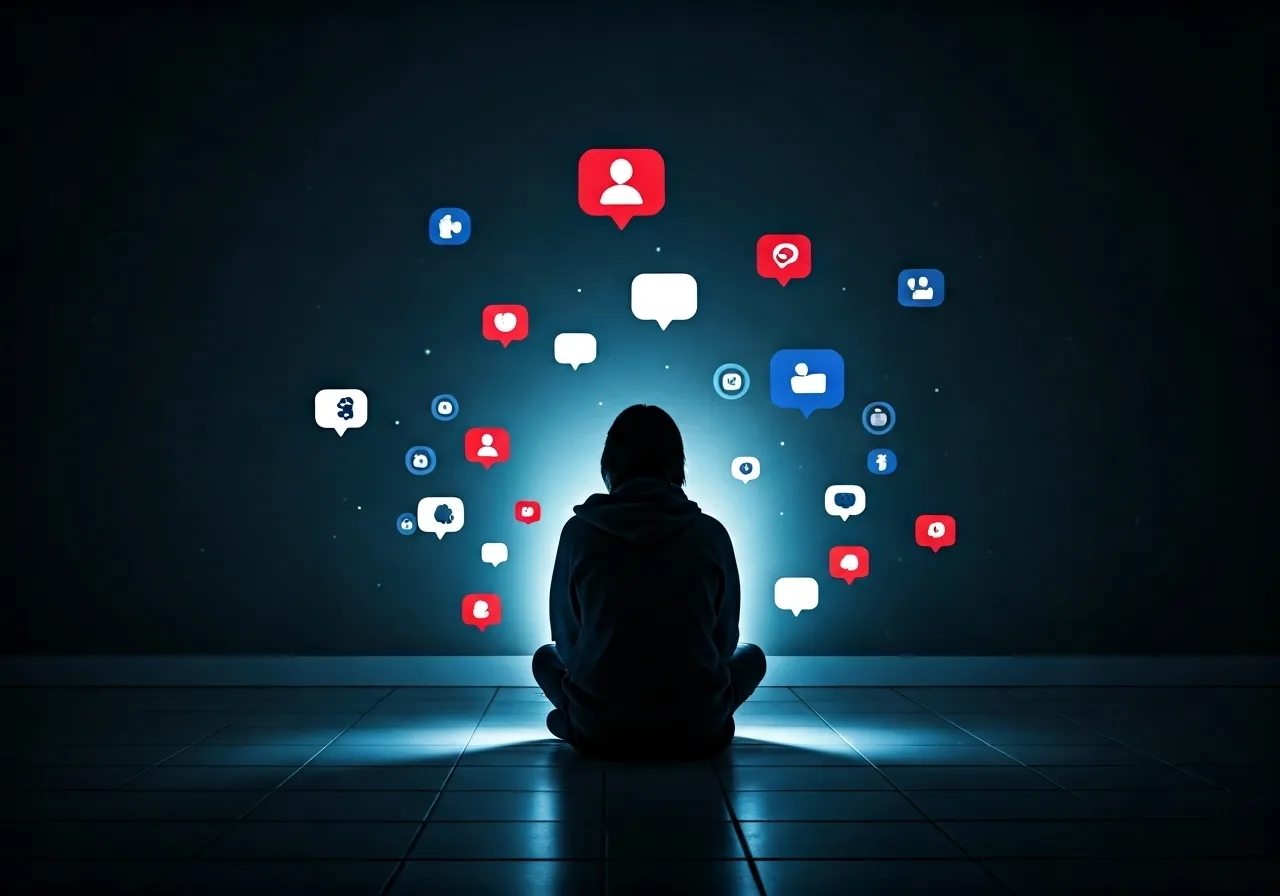
Behavioral addictions, such as excessive social media use, have emerged as significant mental health issues in recent years. Unlike traditional addictions, social media addiction can be subtle, often masked as normal digital engagement. However, the impact is profound—triggering negative feelings and disrupting emotional balance.
Compared to other behavioral addictions, social media addiction is unique in its accessibility and social reinforcement. This constant connectivity can lead to a higher risk of anxiety disorders, a decline in quality of life, and pronounced mental health impact, especially if left unaddressed.
Identifying social media addiction requires awareness of both behavioral and emotional changes. People with this addiction often struggle to set boundaries, leading to increased anxiety symptoms and a noticeable decline in quality of life.
Common indicators include:
If these signs are present, social media addiction may be affecting your mental health. Early intervention is key for breaking the cycle and restoring emotional balance.
The effects of social media addiction reach into many aspects of daily life. It can disrupt sleep, interfere with work or studies, and strain relationships due to increased irritability or neglect of real-world connections. Over time, these disruptions may evolve into more serious mental health disorders.
Daily routines often become centered around checking notifications and scrolling through feeds, leaving little room for physical activity or face-to-face engagement. These habits can lower your overall well-being and intensify feelings of loneliness and anxiety.
Maintaining a healthy balance between online and offline life is essential for protecting mental health and preventing the negative effects associated with excessive social media use.
Children and teenagers in the United States are uniquely affected by social media. Their developing brains and emotional skills make them more susceptible to online pressures, increasing the risk of mental health issues such as anxiety and depression.
Young people often experience more intense reactions to digital feedback and peer comparisons than adults. Because their sense of self is still forming, negative experiences online can have long-lasting consequences, highlighting the need for careful monitoring and healthy guidance.
Children and adolescents possess unique vulnerabilities when exposed to social media. Their emotional and cognitive development is ongoing, making them more sensitive to negative content, cyberbullying, and social exclusion. The impact of these experiences can trigger or worsen mental health conditions.
High levels of screen time have been linked to increased symptoms of anxiety and depression in young users. For some, excessive engagement with social media can disrupt sleep patterns, academic performance, and relationships with family and peers.
Parental involvement and proactive education about healthy social media habits are critical. By setting boundaries and promoting open communication, parents and caregivers can help mitigate the risks and protect children’s emotional well-being in the ‘real world’.
The long-term effects of social media on young users are a growing concern. Constant exposure to online validation and criticism can shape self-esteem, coping skills, and mental health well into adulthood. For many, these early experiences can set a pattern for how they handle relationships and stress later in life.
Negative outcomes from prolonged social media use include increased risk for anxiety disorders, depressive symptoms, and even social isolation. Because the adolescent brain is particularly impressionable, repeated negative experiences online can have enduring impacts.
Fostering resilience through education, peer support, and mental health resources is essential for minimizing the long-term consequences and helping young users build healthy digital habits.
Adults experience the mental health impacts of social media differently than children and teens. While the risks are still present, adults tend to have more developed coping strategies and a stronger sense of identity, which can moderate negative effects.
However, adults are not immune to anxiety, depression, or behavioral addictions linked to social media. Consulting with a mental health provider can help identify unhealthy patterns and develop strategies for maintaining a balanced digital presence.
In Houston, adult users encounter unique challenges related to social media usage. Many rely on these platforms for professional networking, news, and staying connected with family and friends. Yet, the boundary between productive use and overuse can blur.
Environmental factors, such as demanding work schedules and urban stress, can amplify the urge to seek distraction online. This can lead to increased screen time and reduced opportunities for meaningful in-person social interactions, impacting public health across the city.
Efforts by Houston’s public health organizations increasingly focus on educating adult users about the risks of excessive social media use. Encouraging healthy routines and mindful engagement is becoming a key part of mental health initiatives citywide.
Mental health outcomes from social media use differ between adults and young people. While both groups can experience anxiety symptoms and depressive episodes, the triggers and coping mechanisms often vary.
Young people are more likely to suffer from peer-related stress and cyberbullying, leading to acute anxiety and lower self-esteem. Adults, on the other hand, often experience stress related to professional comparisons or information overload.

Recognizing these differences is vital for tailoring interventions and providing appropriate support for each group.
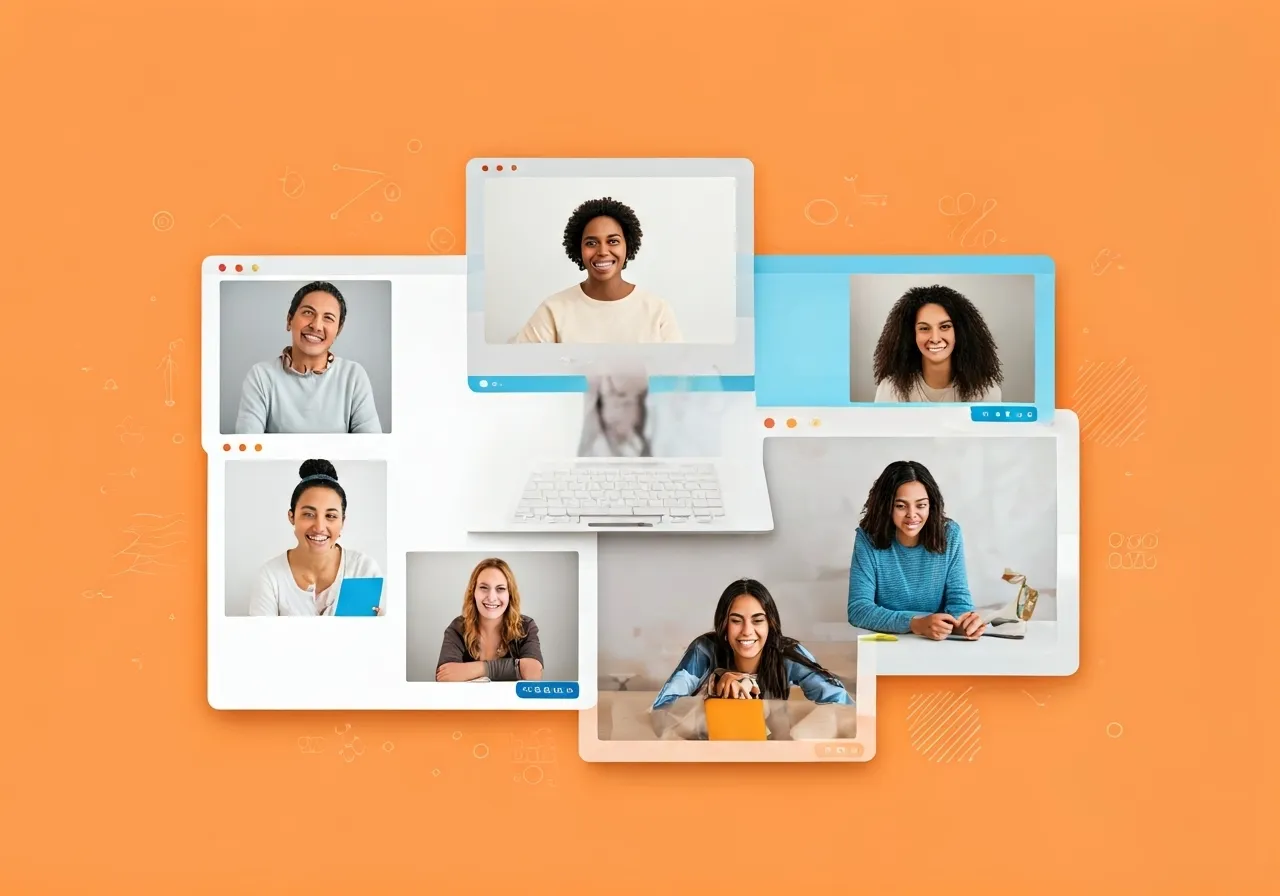
While much focus is placed on the risks, social media also offers significant mental health benefits when used intentionally. These platforms enable positive social interactions, peer support, and the sharing of mental health resources, fostering a sense of belonging.
Opportunities for connecting with support networks and raising mental health awareness abound online. By participating in supportive communities, individuals can find encouragement, education, and understanding from others facing similar challenges—helping to reduce stigma and isolation.
Social media can serve as a powerful tool for fostering social connection and peer support, especially for those who may feel isolated offline. Support networks, whether formal or informal, provide spaces where individuals can share experiences and offer encouragement.
Participating in online communities helps users feel less alone in their struggles. These interactions can increase feelings of acceptance, belonging, and hope. For people dealing with mental health issues, knowing that others understand their journey is invaluable.
When used mindfully, social media can strengthen relationships and facilitate healthy social interactions. Building positive connections online can complement real-world support, promoting a healthier, more resilient approach to mental health.
Online communities play a key role in mental health awareness and education. These platforms provide access to reliable information about mental health issues, symptoms, and treatment options. Many organizations use social media to disseminate educational campaigns and reduce stigma.
For individuals seeking guidance, online communities offer resources and opportunities to learn coping strategies or find professional help. Digital spaces can empower people to recognize symptoms, seek support, and advocate for their own mental health needs.
"Social media can be a catalyst for positive change when it brings awareness to mental health struggles," says Dr. Brian A. Primack. Education and open dialogue foster resilience and help people make informed decisions about their mental health.
Social media use presents clear risks to mental health, especially when habits become excessive or interactions are negative. Main concerns include cyberbullying, emotional distress, and increased symptoms of anxiety and depression, which can erode self-worth and well-being.
Recent research emphasizes the importance of balancing digital engagement with offline activities and nurturing a support system to minimize these risks. Awareness and proactive management are key to reducing the negative effects of social media on mental well-being.
The prevalence of cyberbullying and harassment on social media platforms has become a major source of emotional distress. Individuals may receive negative messages, threats, or public shaming, leading to heightened feelings of anxiety and fear.
For children and young users, these negative experiences can have a deep and lasting impact on their self-esteem and mental health. Adults are not immune—public harassment or trolling can create emotional turmoil and undermine confidence.
Addressing cyberbullying requires a combination of personal resilience, supportive networks, and robust platform safety features. Reporting and blocking abusive users can help reduce exposure to harassment and minimize the emotional fallout.
Feelings of inadequacy often emerge as young adults experience the fear of missing out (FOMO) while scrolling through social media platforms. This phenomenon can escalate into low self-esteem, as constant exposure to curated lifestyles triggers negative comparisons and anxious thoughts. Research from the National Institute of Mental Health underscores the troubling relationship between high social media use and depressive symptoms. Over time, these environmental factors may contribute to heightened anxiety disorder symptoms, impacting overall quality of life and leading to mental health concerns that require attention.
Certain features of social media platforms can either harm or support mental health. Algorithms that prioritize sensational or negative content and "endless scroll" designs can increase screen time, reinforce negative experiences, and trigger anxiety symptoms.
On the other hand, privacy settings, parental controls, and safety features offer tools to promote healthy social media use. Understanding these features empowers users to take control of their digital experiences and protect their well-being.
Social media algorithms determine what content appears in your feed, often amplifying sensational or emotionally charged posts. This algorithmic content delivery can lead to a distorted view of reality, fueling anxiety and negative emotions.
The “endless scroll” design, where users can keep swiping without natural stopping points, increases screen time and makes it difficult to disengage. This can result in more exposure to negative interactions or triggering content, compounding mental health concerns.
Limiting your time and being selective about which accounts you follow can reduce the negative effects of these platform features. Taking regular breaks helps break the cycle and supports healthier use.
Social media platforms offer privacy settings, parental controls, and safety features designed to protect users and encourage healthy social media use. Understanding and using these tools can help manage risks and safeguard mental health.
Key strategies include:
Taking advantage of these built-in features enhances your sense of security and helps maintain positive online experiences. Empowering yourself and your family with digital literacy is an important step in fostering a healthy relationship with social media.
Protecting your mental health while using social media requires intentional strategies. Science-backed tips include setting healthy boundaries, engaging in digital detoxes, and incorporating physical activity into your daily routine. These approaches help prevent the negative effects of excessive screen time and support a balanced, healthy relationship with social media.
Seeking support from a mental health provider or therapist can further enhance your ability to cope with anxiety or depressive symptoms related to social media use. Tailoring strategies to your unique needs makes it easier to sustain positive habits.
Establishing healthy boundaries with social media is essential for protecting your mental health. By limiting screen time and practicing self-awareness, you can prevent the negative effects of overuse and preserve your quality of life.
Effective digital detox tips include:
These habits foster a healthier relationship with digital platforms and allow you to focus on meaningful real-world connections.
For those struggling with anxiety related to social media, professional guidance can make a significant difference. Mental health providers may recommend therapy approaches like cognitive behavioral therapy (CBT), which helps you recognize and change unhelpful thought patterns and behaviors.
Therapists can work with you to identify triggers, set realistic goals, and develop coping mechanisms for managing anxiety and improving your digital habits. "Cognitive behavioral therapy is a proven method for the treatment of anxiety disorders linked to social media use," notes the American Psychiatric Association.
Seeking support from a qualified mental health provider ensures you receive personalized care. Regular check-ins and ongoing education empower you to navigate the digital landscape more confidently and maintain emotional resilience.
In summary, the impact of social media on mental health is complex and multifaceted. While it can foster connection and support, it also poses significant risks, particularly for vulnerable populations such as children and adolescents. By understanding the psychological effects of social media, including anxiety and depression, we can better navigate our digital lives. Implementing science-backed strategies, such as setting healthy boundaries and seeking professional guidance, is essential to protect our mental well-being in this digital age. Remember, maintaining a balanced approach to social media can enhance its positive aspects while mitigating its negative consequences. If you’re struggling with anxiety related to social media, consider reaching out for professional support.
Riaz Counseling in Texas accepts various insurance providers, making mental health services more accessible. Clients can utilize their coverage from BCBS Texas, Optum, Magellan, Aetna, Cigna, and others. This inclusion helps alleviate financial burdens while seeking support for mental health issues.
Yes, social media use can contribute to the development of anxiety disorders in teenagers. Excessive online engagement, peer pressure, and cyberbullying may trigger symptoms of anxiety, such as persistent worry and restlessness, affecting teenagers’ overall mental health and emotional well-being.
To reduce the negative effects of social media on mental health, effective strategies include limiting screen time, practicing digital detoxes, engaging in physical activity, and seeking support from mental health professionals. These actions help improve quality of life and foster healthier digital habits.
People often overlook the mental health benefits of social media, such as access to peer support, educational resources, and positive social interactions. These positive aspects can foster a sense of community and enhance mental health awareness when social media is used thoughtfully.
If you feel that you or someone you know, may benefit from therapy, please reach out to our office for a FREE 15 minute consultation: LINK
Stay informed about the latest research in psychology.
.png)
Explore how Internal Family Systems (IFS) therapy heals trauma and restores self-leadership.
.png)
Explore how Internal Family Systems (IFS) therapy heals trauma, anxiety, and inner conflict.
.png)
A practical guide to recognizing, preventing, and healing teacher burnout in Houston schools.